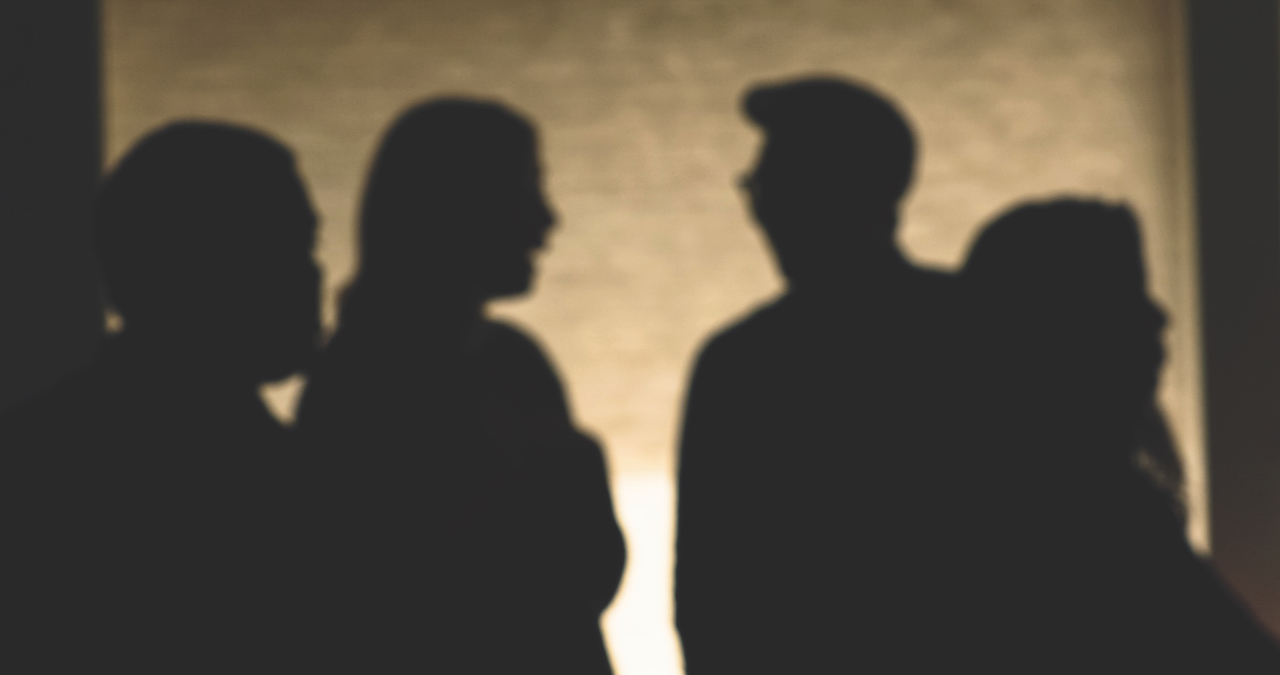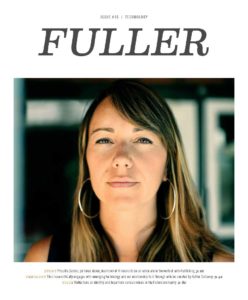
“Humans are not defined in essential but relational terms. That is, unlike the philosophical stream running from Plato to Descartes and into the present, Scripture is not concerned with defining human life with reference to its necessary ‘parts.’ Nor does it concern itself with explaining in what we may regard as a philosophically satisfying way the nature of our physicality in life, death, and afterlife. Instead, Scripture presents the human person above all in relational terms. And it marks the human being as genuinely human and fully alive only within the family of humans brought into being by Yahweh, in relation to the God who gives life-giving breath, and in harmony with the cosmos God has made.”
+ Joel B. Green, professor of New Testament interpretation and associate dean for the Center for Advanced Theological Studies, in “What Are Human Beings? Perspectives from Science and Scripture” on FULLER studio
“Love and trustworthiness are the pillars upon which relationships are built. Love gives individuals meaning about their identities. Simply stated, love is the relational language where we as humans learn about our uniqueness, worthiness, and belonging. Trustworthiness, on the other hand, is the language of action where we learn about the reliable process of giving, the fairness and justice of balancing what we receive, and the openness and vulnerability that leads us to a sense of safety and security in relationships. Love informs our identity while trustworthiness forms our sense of safety. Together, this identity and safety form the nouns and verbs of our language of existence.”
+ Terry Hargrave, Evelyn and Frank Freed Professor of Marriage and Family Therapy, and Sharon Hargrave, executive director of the Boone Center for the Family at Pepperdine, in “Restoring Identity” in FULLER magazine issue #6
“Sometimes when I introduce myself at professional conferences, I say I am a Mennonite feminist evangelical. There are many ways of hearing this, such as that I am enamored with labels or that I am clearly confused. But what I want to convey by appealing to these descriptors is that I am not my own. Whatever hope I have to enjoy that eternal feast with Christ, it cannot come apart from joining myself to the bedraggled, ragtag family into which I have been baptized. . . .
I suspect for many a Fuller student, staff, faculty, and alum, claiming to be ‘evangelical’ sometimes drops from our lips only reluctantly. Perhaps like me, you might have a story of why that label both compels and repels you: It shapes the contours of your life and work, yet it also causes you to shift uncomfortably in your chair as you read an article, view a YouTube video, overhear a colleague’s rant, or listen to certain preachers. Yet despite the unlikeliness of it from a human perspective, I need to claim and be claimed by others if I am to be Christian. When I allow it, Fuller teaches me how to embody these particular identities—Catholic-turned-Anabaptist, feminist, and evangelical—so that they shape me for faithfulness to Christ. Indeed, this last term must shape the other two, so that they foster not merely my desire to be ‘cool’ but rather direct me to the One who finally satisfies my desire to belong and forms me for faithfulness.”
+ Erin Dufault-Hunter, assistant professor of Christian ethics, in “Confessions of a Reluctant Evangelical” in FULLER magazine issue #2

“Ultimately, Jesus Christ is the image of God, the perfect image of God. And we are called to be conformed to the image of God in Christ. So . . . how do we become more Christlike? I believe that we’re all created to be unique human persons—going back to Psalm 139. And so we are not all called to become uniform to Christ but conformed to Christ. And we’re all conformed to Christ as our unique self. Pursuing and understanding our own unique spiritual gifts, our own passions, our competencies, our natural proclivities, I think, is very much part of our vocation and part of our calling to be humans and Christians.”
+ Pamela Ebstyne King, Peter L. Benson Associate Professor of Applied Developmental Science, in “Pamela Ebstyne King on Vocation” on FULLER studio
“What if the stories we tell ourselves and others about who we are and who we are becoming aren’t true? We for sure live in broken stories. We inhabit broken stories. But what if they aren’t true? We understand our stories—our lives—narratively, in the context of story. And we acquire these stories very early in life—pre-memory, really, they begin—as a way to find meaning and to make sense of our experiences. Either real or perceived messages that we internalize and begin to believe about who we are in the world and to make sense of what this place is like. We organize our personalities, too, around these stories. They develop around these stories, these wounds. So we carry these wounds and these wounds become our stories. They’re the stories we tell ourselves and others about who we are. Or the stories that we hide that we tell ourselves. But really they hold incredible influence over our thoughts and our feelings—and our actions. And they distort the lens through which we see the world. . . . The truth is we are multistoried people. There’s not just one story ‘storying’ its way through our lives. We have lots of stories that we hear and believe from moment to moment every single day. Now some of those stories aren’t bad. They’re just lesser stories. And when you acquire one of these stories and make it the large dominant narrative of your life, then you are trapped in this constricted world. It’s very important—and part of our sanctification if you will—that we find the thread of our own story amid the cables and the knots and the networks of our broken stories. That’s in part our task.”
+ Ian Cron, speaker and author, in his talk “Finding Our True Selves” on FULLER studio
“Somewhere along the way, I had fallen in love with the archetype of the Tall White Man. For almost 400 years, my ancestors have been conditioned to know a Jesus embodied in people who did not look like them. First, they fell in love with a Spanish, Catholic Jesus for 350 years. And then an American, Protestant Jesus for at least 50 more years. My love affair with the metaphorical Tall White Man started hundreds of years before I was born. I wanted to be the Tall White Man. I’m addicted to the ‘atta girls’ and ‘good jobs’ and A’s and distinctions because deep in my psyche I actually believed that if I could just get the degree, the ordination, the title, and the grades, maybe I would actually achieve full maturation into whiteness. Maybe then I could be accepted. And because of the ways I have been slighted, overlooked, mistreated, infantilized, and underestimated, I also resented the Tall White Man. Christian academia has always been white-male-centered, but as hard as I’ve tried to mature into something else, I am today and will be tomorrow a short, brown woman who can’t speak her mother’s tongue. I always knew I was in a system built for someone else, but what I didn’t realize was how much I believed that the system was right.”
+ Joyce del Rosario (PhD ’19), in her sermon “Dying to Self” delivered at Fuller’s All-Seminary Chapel and available on the FULLER sermons podcast

“My mother’s generation was one where, for the most part, everyone was calm. Their identity, who they were, was very much centered in how they took care of the home and what kind of childhood they gave us. My mother was dedicated to giving me this extraordinary childhood. She invested her whole self in me, so when I did not affirm her life choices by going someplace different—it was one of the big struggles for me. I had very few people at the time affirm the way that I felt I needed to go. But I had a lot of voices, my mother in particular, that were not supportive of my not being full-time in the home. I got a lot of grief about all the sacrifices that I was going to make because I was not going to be giving the same kind of childhood to my kids that my mother had given to me. It was going to look different, and that scared me half to death. There were some men who sat me down and said, ‘You are going to destroy your kids’ lives. You are making huge sacrifices,’ and so many times throughout my life I would just hear those voices repeated in my head: ‘I am making the biggest mistake of my life. I am going to destroy my kids.’
These decisions that we make around life/work balance . . . When I was starting out in ministry there was a very well-known organization in this country that was promoting that women’s roles were to be full-time in the home and that was what women could do, and that’s what women should do. Anything else was not biblical. It was difficult. There were people explaining that my choice to head up a nonprofit as a woman meant I was going to hell. I was just going to hell! I was having to work against that and having to work against my mom’s voice that said, ‘What do you mean you’re not cooking homemade lasagna for dinner tonight?’”
+ Meritt Sawyer, pastor and Fuller trustee, in “Story Table: Women” on FULLER studio
“Born with cerebral palsy, I am a disabled woman with serious shame about my inability to work and be a productive member of society. This personal shame has often led me to question my value in the eyes of God. Am I only valuable to the kingdom of God because of the work I can do to further its presence on earth? What if I continue to have periods of being bedridden? Am I worthless then? Valueless? God has been patient with me as I continue to struggle with these questions. Recently I was made aware of Jesus’ words to the people as he delivered the Sermon on the Mount. He spoke to them, saying, ‘Look at the birds of the air; they do not sow or reap or store away in barns, and yet your heavenly Father feeds them. Are you not much more valuable than they?’ I ask myself—and we might do well to ask ourselves—‘What determines my value in the eyes of God, if not my productivity?’ So often, I’m reminded that we love him because he first loved us. Our relationship with God helps us to see our value. We are worthy because God deems us worthy.”
+ Elizabeth Staszak, MDiv student, in “Where Do You Find Your Value?” on Fuller’s De Pree Center’s blog
“Our different cultures pick out, for various reasons, certain aspects of human experience and cultivate them. It gives them names. It symbolizes them. Makes them feature in stories. Creates speech forms that will highlight them and so forth. These are the things that change over time. The cultural cues. So am I saying really the basic elements of the self are universal and it’s just the cultural shaping that changes? Not quite. Because our cultural practices—including the symbols we use, the stories we tell, etc.—these practices will reinforce certain synaptic patterns in our brains and so make these connections stronger in our minds. So culture does in certain respects shape and reshape the brain and so makes us literally different people. If cultural practices give us words for various aspects of emotional and interior experience, if it gives us forms of speech that name and model acts of introspection, or puts before us characters who express and enact inner conflict or soul searching and repentance, then we begin to pay attention to the corresponding features of our own experience and value them and cultivate them. In that sense we do have a different self experience. We become different selves than we would be if we were equipped with different cultural resources.”
+ Carol A. Newsom, Charles Howard Candler Professor of Old Testament at Emory University’s Candler School of Theology, in “FULLER dialogues: Sin, Spirituality, and the Self,” originally delivered at the 2019 Payton Lectures
“We tend to dismiss stories of our past. Why? We think they’re irrelevant, uninteresting, embarrassing, hurtful, or shameful. However, our past can be our biggest asset. Those experiences tie us to history, to a specific moment in time. They tie us to our family and our ancestors. They make up who we are. Knowing our immigrant stories unlocks another layer of our identity. The United States is predominantly a nation of immigrants, whether they historically came enslaved or voluntarily. And so, unless one is a native First Person, most of our families have an origin story from elsewhere. We all have a story, a history of people migrating. Learning this story can help us empathize with other people groups, finding compassion through the shared struggles immigrants often face in coming to a new country. There are a variety of ways to trace our immigrant story. We can ask our eldest relative. We can look at church denominational family records. We can examine city records and census data or naturalization records. There are even online databases that contain records, such as immigrants who arrived via Ellis Island or Angel Island. Or we can join ancestry websites or submit our DNA for testing. Our past connects to our present, and those past stories and experiences help us recover a sense of who we are.”
+ Giovanny Panginda (MDiv ’17), project coordinator at Fuller Youth Institute, in “Finding Abundance Through Reclaiming Our Immigrant Stories” on the Fuller Youth Institute blog
“Every aspect of yourself, whether it’s the most painful—maybe it’s the most presentable—has to be fully transformed. And a lot of people who don’t talk about identity are the people who are normative, who can say, ‘Well, I’m just a person.’ In America, it’s actually people who are white, people who are male, who are heterosexual—people who are like, ‘I’m just a person.’ You’re just a person? You know, I spend a lot of time at Fuller telling every single student, even the white students, ‘It’s so important you know the fact that you have a particular color, skin, [culture, and story]’ . . .
Because all that you do—you’re embodying the gospel with this thing—it’s basically what’s going to help you to be fully transformed. It’s almost like you’re working the gospel into the dough of your life. You’re working every bit of it. Maybe there’s some past, some structure, some history you don’t want to know. It’s not pretty, but it must be transformed by the gospel. Christ will have it all. He will have every part of you transformed. Even the part of you that you’re like, ‘This is just a liability, there’s no point to this thing’—no, that too. He will have that transformed and used for God’s kingdom.”
+ Daniel D. Lee, assistant provost for the Center for Asian American Theology and Ministry and assistant professor of theology and Asian American ministry, in “(You Don’t) Know Yourself,” delivered at the 2018 Urbana Missions Conference and available on the Asian American Center’s website, Centered
“We belong to God. We are his. In 1 Corinthians 3, Paul writes, ‘We belong to Christ and Christ belongs to us.’ And again in Galatians 3: ‘So in Christ Jesus you are all children of God through faith . . . There is neither Jew nor Gentile, neither slave nor free, nor is there male and female, for you are all one in Christ Jesus.’ As humans, we are created to long for and to be in relationships. Our trinitarian God, who created us in his image, has instilled in us a desire to belong to one another and to live interdependently. Belonging gives us security. It serves as a secure base from which we can live into our imaginations and flourish without fear. The many years of clinical and neuroscience research on attachment affirm this truth. That being attached to and belonging to another person is critical for biological, emotional, psychological, and spiritual survival—let alone thriving. Belonging to God, who loves us and is all-sufficient, results in a life of freedom and shalom.”
+ Miyoung Yoon Hammer, associate professor of marriage and family therapy and chair of the Department of Marriage and Family Therapy, in “FULLER dialogues on Relational Integration,” originally delivered at the School of Psychology’s 2017 Integration Symposium

